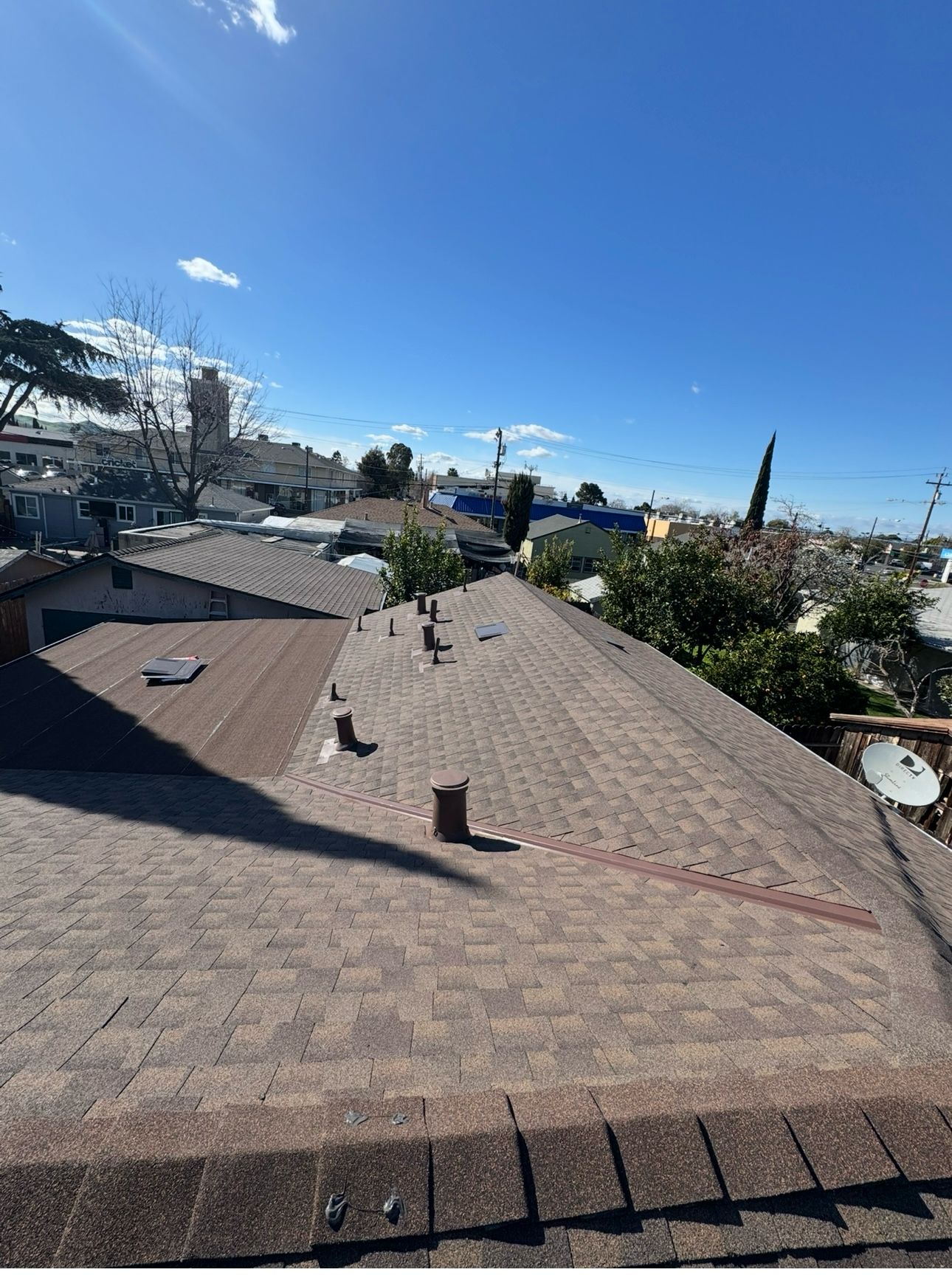Do you use the same types of roofing for residential and commercial projects?” This is one of the most common question we get asked here at Golden Heights. While residential and commercial building roofs might seem similar, they have major differences that require different skills and materials.
Commercial and residential roofing systems services are distinct because each building has different requirements and materials used. As professional roofers and roof engineers, we know which materials and type of roof can work best for every occasion and type of building’s roof.
Residential vs. commercial roofs
Residential roofs are primarily focused on providing protection and curb appeal to your home. They often prioritize insulation for temperature control and ventilation for improved indoor air quality. Drainage and gut systems prevent water damage and leaks in the attic and below. Home roofs have more aesthetic and design choices so that they can best match the architecture of the home itself.
Commercial roofs require more extensive insulation for energy efficiency, as well as proper drainage systems to prevent water pooling, which can lead to structural damage. Additionally, commercial roofs may need to accommodate equipment installations which is why they are often flat. Often, commercial roofs should provide for frequent foot traffic if technicians and installers have to service equipment located there.
Golden Heights roofers have worked on both commercial and residential projects. When we start a roofing project around the Bay Area, we discuss with our clients their options and their expectations. We will answer all your questions and help you find the right type of roof for your needs. Should you have any unanswered questions, please don’t hesitate to reach out, and we’ll be happy to help you out!

What is residential roofing?
Residential roofing is about the construction, repair, and maintenance of roofs on houses, apartments, and other living spaces. It’s geared towards the specific needs of homeowners and residents and focuses on comfort, safety, and the look of the property. Most home roofs have slopes and our residential roofers work taking into consideration chimneys, vents, and other features.
Common types of residential roofs:
Asphalt Shingles. Asphalt shingles are the most popular choice as they are affordable and easy to install. They come in various colors and styles, making them a favorite among homeowners looking to balance cost-effectiveness and curb appeal.
Metal Roofs. Metal roofing is popular for its durability and energy efficiency. It can withstand harsh weather conditions and often lasts for decades. This type of roof is ideal for those who want a long-lasting solution with minimal maintenance.
Clay Tiles. Clay tiles are famous for their timeless beauty and Mediterranean-inspired looks. They are exceptionally durable, highly insulating, and add a touch of elegance to residential properties, though they can be costlier than other options, especially because they are more expensive to install.
What is commercial roofing?
Commercial roofing installation is a specialized field that provides durable and reliable roofing solutions for businesses, industrial facilities, and large-scale structures. The difference between commercial and residential roofing is that commercial roofing emphasizes functionality, longevity, and cost-effectiveness. It is often tailor-made, based on the needs of the business. Commercial roofs are generally much larger than residential ones which is why cost is an important criterion.
Common types of commercial roofs:
Flat Roofs. Flat roofs are a common choice for commercial properties because they are practical and suitable for HVAC equipment installation and other commercial roofing systems. They offer easy access for roof maintenance, roof repair and are practical to install and maintain.
TPO (Thermoplastic Olefin). TPO roofing is known for its energy efficiency and reflective properties. It provides excellent protection against UV rays and is often used in eco-conscious commercial roofing projects.
EPDM (Ethylene Propylene Diene Monomer). EPDM roofing membranes are cost-effective and durable. They are resistant to ozone and weathering which makes them a reliable choice for many commercial buildings.
Structural differences between commercial roof and residential roof
Residential and commercial roofing services have important structural differences that significantly impact their performance and design.
1. Load-Bearing Capacity.
Residential roofs and residential roofing materials are typically designed to bear the weight of seasonal weather conditions and occasional maintenance activities.
Commercial roofs are different from residential as they must support heavier equipment like HVAC systems and sometimes foot traffic. Thus, they need stronger load-bearing capabilities.
2. Slope.
Residential roofs often feature steeper slopes to effectively shed rain and snow. Commercial roofs, on the other hand, commonly have flatter or low-slope designs to accommodate equipment and provide usable rooftop space. When commercial roofers install a new roof, they must therefore make sure no water pools, because it can then easily seep through.
3. Design Variances.
The design of residential roofs emphasizes aesthetics and curb appeal which is why residential roof materials come in many materials, colors, and styles. Commercial roofs prioritize functionality and durability and focus on materials that provide superior protection and longevity.
4. Cost Factors
Commercial roofs tend to be larger than residential ones. The cost factors in significantly, and many businesses choose affordable yet durable solutions for their roof. The question of aesthetics is less important.
Homeowners often go the extra length and invest in stylish yet expensive roofs to improve the resale value of their homes and extend the lifespan of their roofs.
Roofing companies typically fall into two categories: those who specialize in residential roofing and those who specialize in commercial roofing. However, some roofing contractors have the expertise to work on both types of roofs. Therefore there is no need to hire a company specialized only in one of those two fields.
These roofers have different crews with a broad skill set that helps them fulfill both residential and commercial roofing projects. Here at Golden Heights, we understand the different types of structural services, roof replacement, roofing material requirements, and design specifications for both residential and commercial roofing. We have the right qualifications and experience to work on both types of roofs and we excel at the craftsmanship and workmanship we deliver.
Trust Golden Heights for Your Roof
Are you ready to build your new commercial or residential roof or repair your existing one? Contact Golden Heights, your trusted roofing company! Connect with us, get a free quote and let’s get started!
Frequently Asked Questions
Commercial roofing vs residential roofing: What is the difference?
The main differences between residential and commercial roofing installations lie in their structural design, materials, and purpose.
Residential roofing is primarily for homes, featuring a variety of materials for curb appeal.
Commercial roofing serves businesses and industries, focusing on durability and functionality, often with flat or low-slope designs.
What roofing materials are typically used in residential and commercial projects?
In residential roofing, common materials include asphalt shingles, metal, and clay tiles for their aesthetic variety. Commercial roofing often uses materials like TPO, EPDM, and modified bitumen for their durability and low-slope suitability.
Can a roofing contractor work on commercial and residential properties?
Yes, some roofing contractors can work on both commercial and residential properties if they have the right roofers and expertise in such varied roofing projects.
Are the skills required for commercial roofers distinct from those needed by residential roofers?
Yes, the skills needed by commercial roofers differ from those required by residential roofers due to the structural complexity and specific demands of each type.
Commercial roofers must understand low-slope designs, and larger-scale projects, and often work with specialized materials.
Residential roofers focus on steep-slope designs, a variety of materials, and how the roof should match the architectural design of the home.


